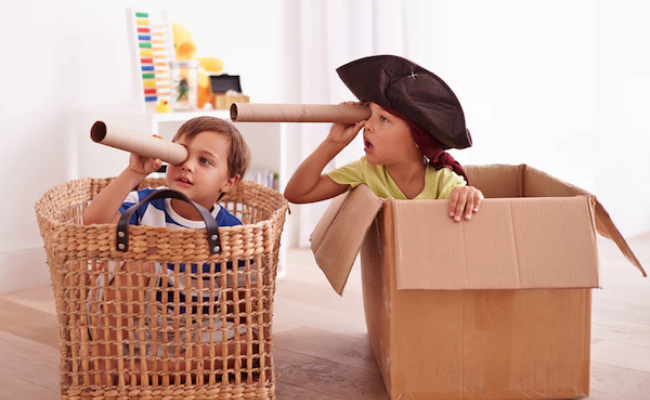The Power of Make-Believe: Using Dress-Up to Help Kids Develop Social Skills
Playing make-believe and dressing up is a fun pastime for children and an essential part of their social and emotional development. Children learn crucial skills like empathy, communication, cooperation, and problem-solving through imaginative play.
Dress-up play also allows kids to explore different roles and scenarios, allowing them to practice social interactions and develop social skills in a safe and playful environment.
In this article, we will delve into the benefits of imaginative play and provide practical tips on encouraging this vital form of play at home, including setting up designated dress-up and play areas and incorporating everyday objects for more creative fun.
Benefits of Make-Believe Play for Children’s Social Skills

Research has shown that make-believe play has numerous benefits for children’s social skills. Through role play and pretend play, children learn empathy by stepping into someone else’s shoes. They also develop communication skills and improve their problem-solving abilities, all while having fun!
Shop dress-up and playtime essentials
Practical Tips for Encouraging Make-Believe Play at Home
Encouraging imaginative play can be simple and enjoyable. You can create dress-up activities or imaginative play scenarios to spark your child’s creativity, like tea parties, superhero adventures, or even pretending to be astronauts.
Materials for make-believe play can include dress-up clothes, dolls, building blocks, and everyday household items like cardboard boxes or kitchen utensils.
Remember to play with your child and take on roles to model imaginative play. If conflicts arise during play, use these opportunities to teach problem-solving and conflict-resolution skills.
Overcoming Gender Stereotypes in Make-Believe Play
It’s important to avoid reinforcing gender stereotypes in make-believe play. Encourage your child to explore diverse roles and scenarios, regardless of gender. Provide various dress-up options and props for diverse and inclusive play, so your child can explore their creativity without limitations.
Browse a wide selection of imaginative play materials here
Examples of Successful Interventions and Programs
Many successful interventions and programs use make-believe play to improve children’s social skills for the real world. For example, some schools and organizations incorporate drama and role-playing activities into their curriculums to help children develop empathy, communication skills, and problem-solving abilities.
For instance, the Playtime Project serving people experiencing homelessness in Washington, DC, has demonstrated success in improving children’s social skills through structured imaginative play activities. Reach out to experts in the field or consult case studies to learn about the achievements of these programs and how you can apply them at home.
Conclusion
Make-believe play is a powerful tool for fostering social skills in children. Parents encouraging imaginative play at home can help their children develop empathy, communication skills, and problem-solving abilities in a fun and engaging way.
Don’t forget to consider further reading on this topic to expand your knowledge and support your child’s development. Visit Teetot to get started with empowering your child’s imagination.
FAQs
1. What are the benefits of make-believe play for children’s social skills?
Make-believe play helps children learn empathy, develops perspective-taking abilities, encourages creativity and imagination, and provides opportunities for practicing communication and problem-solving skills.
2. How can parents encourage make-believe play at home?
Parents can provide open-ended toys and props, set aside dedicated time for play, and actively participate in and encourage make-believe play with their children.
3. What are some potential drawbacks of relying solely on make-believe play for social skill development?
Potential drawbacks include limited exposure to real-world social situations, restricted opportunities to practice complex social skills. There’s also a possibility of reinforcing gender stereotypes.
4. How can make-believe play be combined with other activities to enhance social skill development?
Children can engage in cooperative play with peers, participate in real-world social situations, and incorporate storytelling. They can also do role-playing during reading time to develop a comprehensive range of social skills.


